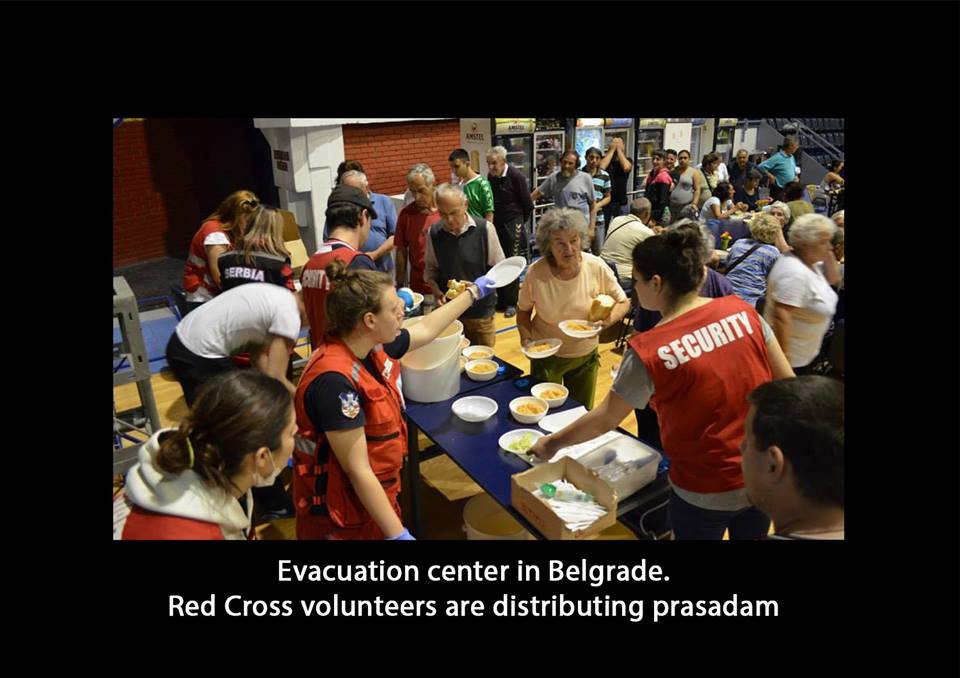In the early days of my service to Food for Life, I got to travel through the former soviet union, eastern Europe and the Balkans. I ventured into war zones in Chechnya, Georgia and Sarajevo. But one thing surprised me more than anything else: I found the people in these parts of the world to be the most enthusiastic to start a Food for Life project and the scope seemed unlimited. Many young men and women asked me what to do and how they could model the success of what we had done in Australia. One of those young enthusiasts was Krishna devotee, Srinivas das, who took on the task of developing Food for Life in Belgrade, Serbia.
He very methodically built a program from the ground up and followed all the good practices of others before him in Western Countries. Srinivas was able to get the support of the UNHCR and the Red Cross and position his Food for Life project as an essential partner in improving the social injustices that were present in Belgrade at the time. His project was a model of success for other projects in Eastern Europe and I encouraged other projects to follow suit and work for ways to cooperate with the more established NGOs in the area. “It was the most effective way to build credibility,” I told FFL volunteers, and in fact, partnering as such became an important ingredient in a book I would later release called, The 10 Ingredients of Success, later revised and republished at How to Develop a Successful Food for Life Project.
Sadly, however, with the changing political and financial landscape of Serbia, over time, the program he built stalled, lost steam and stopped.
The Balkans floods
The flood disaster that devastated large parts of Serbia, Croatia and Bosnia stimulated a new enthusiasm to revive Food for Life in Serbia. Krishna devotees in the area took up the task to start feeding as many people as they could. They were not prepared; they did not have the proper facility, equipment, nor expertise in such situations, and neither did they have a registered charity to legally participate in such relief work. But none of this stopped them. Their hearts were pumping with enthusiasm and compassion and they just knew they had to do something, and they did, and it has been nothing short of amazing.
FFL coordinator for Serbia, Madhva Muni reports:
“Since May 18, 2014, volunteers in Serbia cooked and distributed around 10,800 meals to people who had been evacuated from the flood-affected areas. Meals were also distributed directly in the flooded city of Obrenovac and villages around Shabac. The Krishna society in Serbia is lacking full-time volunteers and there is no registered FFL charity, nor is there a temple property or vehicle, and yet somehow or other, we managed to feed so many people!
“…the crucial support of one family (Ristich) that owns a biscuit factory called Bioland. This generous family gave over their factory kitchen for the first few days”
“The cooking was going on in a two places, one in Novi Sad, by the crucial support of one family (Ristich) that owns a biscuit factory called Bioland. This generous family gave over their factory kitchen for the first few days to help us get started. Later the cooking continued at different places to avoid serious penalties for not being licensed for such food distribution. The volunteers were daily driving to Belgrade (100 km in one direction) and they also supported the effort with money, cooking gas and vegetables.
“In Belgrade, experienced catering chef, Dhanurdhar das and his assistants managed to cook a combined total of 600-1300 meals per day!”
Rather surprised, Madhva Muni commented, “The amazing thing is that most of the help needed to conduct this relief effort came from outside of the community.” This was a new experience for the members who up until this time had felt alienated. It seemed that the disaster was bringing all people together in a sprit of brotherhood and indiscriminate compassion.
“Transportations was arranged spontaneously by someone everyday. People came to the unofficial Hare Krishna temple in Belgrade to pick up buckets of hot food (prasadam) and would then deliver it to various shelters. Some even repacked the meals into lunch boxes and distributed them personally to victims and volunteers in the field,” he explained.
The Serbian police and army also helped the FFL volunteers to distribute meals in restricted flooded areas, by transporting meals on special high-wheeled trucks.
The newly revived Serbian Food for Life project partnered with the Student Union of Belgrade, who donated van-fulls of vegetables, since they couldn’t cook as much as the FFL volunteers. The Hare Krishna volunteers shunned all recognisable religious symbols like tilak in order to cooperate with some of the more nationalistic movements, such as the Orthodox church, Jewish community and even the Belgrade Red Cross.
During the early 90s, such practices were covered exclusively by Food for Life Serbia. The project back then had cars, money and influence. Many volunteers were engaged in distributed meals all day around Belgrade. Local vegetable market vendors happily provided all the necessary supplies to do their work. Now, however, gathering donations of fruits and vegetables was being managed by the Student Union. Food for Life in Serbia had come of age: no more do they think of the service as an exclusive Krishna project, but fully embrace the universal appeal of sharing pure food and how Food for Life can be a catalyst for bringing the community together. All that is required is good management and an open mind.
Madhva Muni continued, “In Novi Sad, we had more than 20 student volunteers cutting vegetables every day for FFL and happily following the strict standards of hygiene that FFL is famous for.”
With just handful of members and the enthusiasm of our local community, FFL in Serbia has accomplished a lot. “We are now seeing the power of this project,” said Madhva Muni.
After taking on the responsibility to daily feed around 1000 evacuated people hosted in Belgrades sports centres, FFL Serbia earned so much trust of the Belgrade Red Cross, that they are now counting on FFLs involvement in future humanitarian relief efforts.

Sadly, Srinivas past away two years ago, but his legacy lives on!
How you can help
Food for Life and the Krishna community in Serbia wish to thank all who have donated money, time, energy and enthusiasm to this effort. Please continue to help this important mission. Donations can be made through PayPal to: donacije.sns@gmail.com and soon through their official bank account.
Recently the grandson of Henry Ford, Ambarish Ford donated $5000 to the new Food for Life Serbia project. For all US Citizens wishing to make a tax-deductible donation, you can donate via Food for Life Global.
You can help us by making tax-deductible donations through Food for Life Global. Donations will be shared between our FFL teams in Serbia and Bosnia.








